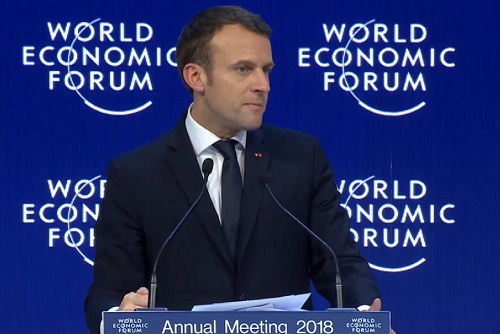
The president of France said the Europe Union should press forward with concentrating power over political and economic issues in its own hands, even if its 27 member states dissent.
Only a continent-wide supranational government would allow Europe to rival the United States and rising Asian economies, Emmanuel Macron told attendees of the World Economic Forum in Davos on Wednesday.
Europe alone holds the proper “synthesis” of “values,” falling between America’s “strong preference for freedom” and China’s … different approach. (One can nearly her Charles de Gaulle denouncing the “deux hegemonies.”)
“If we want to avoid this fragmentation … of the world,” Macron said, “we need a stronger Europe.”
However, “Europe is able to be this new power” only after thoroughly concentrating sovereignty over its members’ policies at the level of continental government.
Macron promoted a 10-year strategy “to make Europe a natural, economic, social, Green, scientific, and political power.”
This “more sovereign, united, and democratic Europe” would exercise greater power over “migration, digital, energy, defense, development, finance, investment – the core of what makes you sovereign.”
“We have to build our common [European] policies” over these areas of concern, he told the thousands of attendees at Davos – even if the remaining 27 nations demur. The centers of European political power – Brussels, Strasbourg, and Frankfurt – should no longer wait for a consensus among their members before acquiring these powers, he said.
Instead, Macron called for “an avant-garde of Europe to deliver on these issues”:
And we have to change our methodology, which is not to wait for all the people around the table before moving forward. It is just to say, if some people are ready to be more ambitious, to go further in terms of integration and ambition of what makes you sovereign as a power in this global environment – to defend your values and your interests – then let’s move. The window and the door is open all the time. But those who don’t want to move forward shouldn’t block the most ambitious people in the room.
Depending on one’s point of view, this is either a boldly Burkean call for Europe’s politicians to serve the common good despite popular sentiment, or a crassly anti-democratic bureaucratization of European life.
Macron has long advocated a stronger, more integrated eurozone, complete with its own budget and common “eurobonds.” Enlarging the euro has both fiscal and moral difficulties, as Religion & Liberty Transatlantic authors Michael Maibach and Marcin Chmielowski have noted – from Washington, D.C., and Warsaw, respectively.
Further, Stephen Copp has written, “The EU utopian vision, like all utopian visions, clashes with the ideal of self-determination, an ideal so important that it is at the heart of Western civilisation’s self-understanding.”
Can pressing forward with an “ever-closer union” over members’ objections unite the world, or will it lead to the further fragmentation of the EU? And can the EU disregard the will of a substantial portion of its members and still claim to embody “European values” – particularly limited government, democracy, and self-determination?
You can view Macron’s full speech below:

